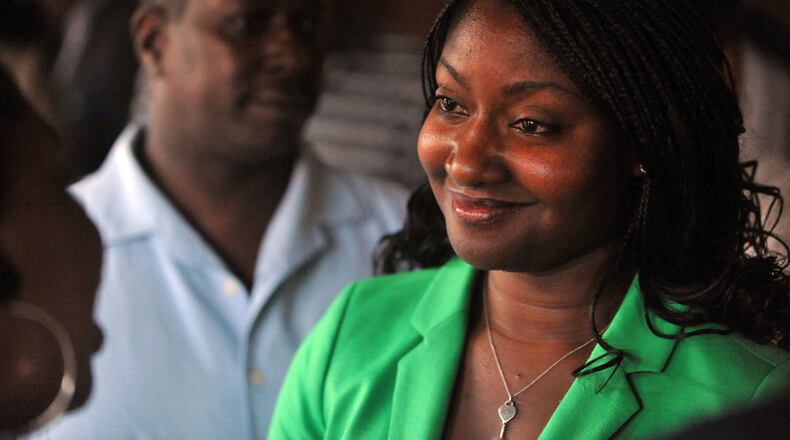A charter school once heralded as a beacon for public education has fallen on troubled times, raising questions about its survival.
Ivy Preparatory Academy, a middle school for girls in Gwinnett County, was a poster child for the 2012 constitutional amendment that empowered the state to authorize — and pay for — more charter schools. Now, poor academic performance and plummeting enrollment threaten its survival.
Enrollment has dropped precipitously, and so has funding, which is based on head counts. The school cut nearly half its teachers recently. The social studies teacher for one of Rina Mogos’ two daughters left around Thanksgiving, and the science teacher has been absent a lot, Mogos said. Sometimes there are substitutes, and sometimes there aren’t, said Mogos, who is the PTSA treasurer.
“The kids don’t have teachers,” she said. “I feel like they’re not learning anything.”
In November 2012, Gov. Nathan Deal wrote in The Atlanta Journal-Constitution that charter schools outperform traditional schools. “A great example is Ivy Prep School … that is outperforming the general population in Gwinnett County schools, which are some of the best in the state.”
That year, it had well over 400 students but by this fall, with a recent history of Ds on the annual state report card, it had dropped to fewer than 100. The resulting cuts in state payments forced mid-semester teacher layoffs, and two principals have left since last semester, one this month.
Ivy Prep’s troubles highlight the plight of charter schools, which operate independently using public dollars. They must continuously prove their worth, facing closure if academic performance slips too far. Even slight declines can cause parents to choose their neighborhood school instead. Enrollment drops trigger funding cuts that cause layoffs that can decrease academic performance and discourage enrollment, in a vicious downward spiral.
The Ivy Prep parents got worried enough to call on the school’s founder, Nina Gilbert, who’d long since moved on. She recently became PTSA co-president. Last week, she held a meeting at the YMCA to teach parents “advocacy.” She said, “The school right now is under performing because we have gotten away from our best practices.”
Only a handful of parents attended, which some took as another sign of decline, since parents used to be heavily involved. It could also be a sign that most are satisfied, which is how the school’s current leader sees it.
In 2015, former state lawmaker Alisha Thomas Morgan was hired to run Ivy Prep’s growing network of schools, which by then had expanded into neighboring DeKalb County. The leader, since remarried with her surname changed to Thomas Cromartie, said she is puzzled by the “disgruntled” faction of the PTSA, which she described as “an isolated group.”
She acknowledged the school’s shaky situation, but said financial troubles were there from the start, driven by a $56,000 “unsustainable” monthly lease negotiated long ago, not to mention the limited funding for charter schools. Teachers weren’t getting paid on time, and turnover approached 80 percent, she said. “When I arrived, teacher morale was really low.”
She has since abandoned one of the building’s two wings and negotiated the price for the remaining one down to around $20,000 a month. But the relentless enrollment declines caused her to eliminate four teachers this semester.
Thomas Cromartie said charter schools have a financial disadvantage, especially those authorized by the state, which don’t get a cut of local property tax dollars. She estimates the typical Gwinnett neighborhood school gets $9,000 per student while Ivy Prep gets $7,500. Charters also must employ staff to file the federal and state “compliance” paperwork that a district central office normally handles.
These are challenges she didn’t appreciate as a young lawmaker who became enamored of Ivy Prep when its girls visited the Captiol to lobby for the constitutional amendment. “I would say I definitely underestimated it.”
Even so, she says she can turn the school around. She points to the performance at the surviving Ivy Prep in DeKalb, another girls school.
She closed the boys school there last year due to poor academic performance (after she closed the high schools at all three campuses due to financial challenges), but the girls school has improved. She said she’s confident the interim principal she just installed in Gwinnett, an Ivy Prep veteran she recruited from the DeKalb campus, can restore a culture of rigor. Girls who have fallen behind due to the staffing disruptions will get tutoring on weekends, she said.
Despite a D on the 2015-16 state report card, the State Charter Schools Commission gave Ivy Prep Gwinnett a passing score, judging it had outperformed the districts where its students live. Thomas Cromartie said that as far as she can tell the school did not beat Gwinnett in the 2016-17 school year, but did better than DeKalb. Since many of her students come from DeKalb this could help next spring, when the commission decides whether to renew the charter.
A more immediate concern may be stanching the enrollment bleed. The commission looks at factors like operational integrity and financial stability. Ivy Prep failed the commission’s financial measure in 2015-16 and needs a much better score for 2016-17.
A couple of days after the PTSA meeting, Thomas Cromartie held a meeting on campus to address the concerns. Samara Wilson was put at ease, saying she’d rather keep her daughter there than in her neighborhood school because “I believe in the academics here.” But Kiyona Smith, who arrived too late for the 4:30 p.m. meeting, stood steaming in the parking lot with a wiggling toddler on her hip. She was just getting off work when the meeting started, and said the timing, like unanswered emails, make for poor communication.
She has a daughter at Ivy Prep and another in high school who attended several years ago and said the school has gone downhill. “I believed in everything the school stood for. Now, no one knows their place; no one knows their position,” she said. “No one knows where they’re going to school next year — if the school’s going to close.”
About the Author
Keep Reading
The Latest
Featured



